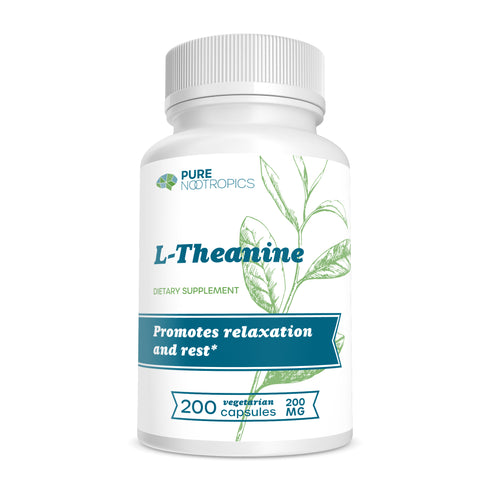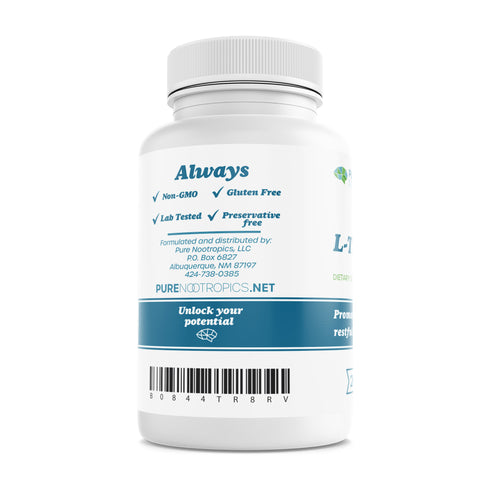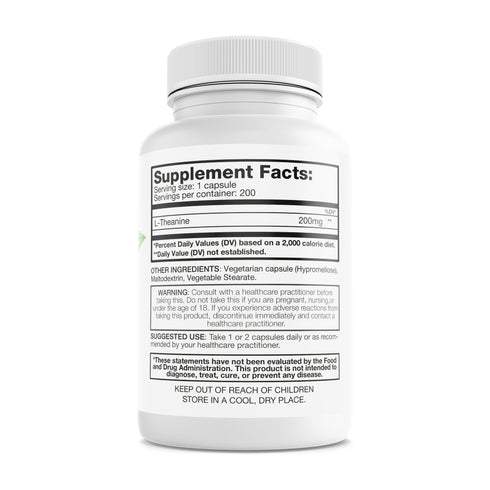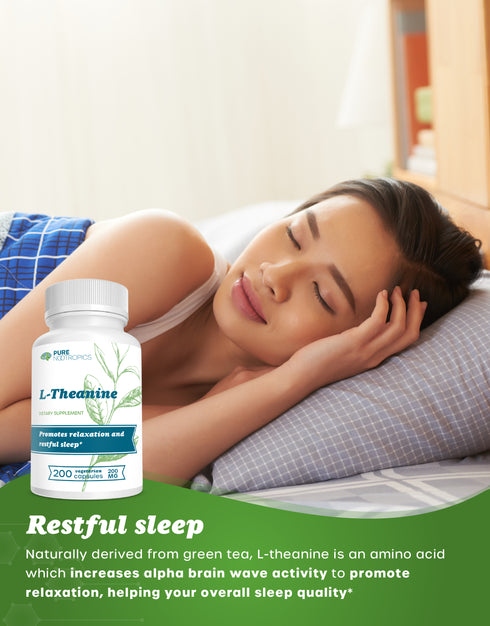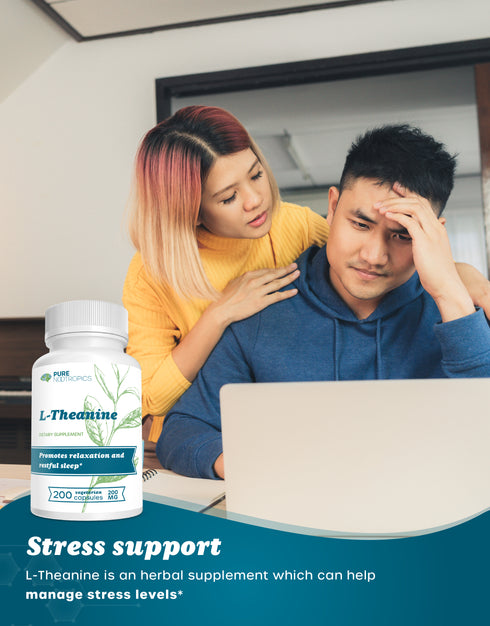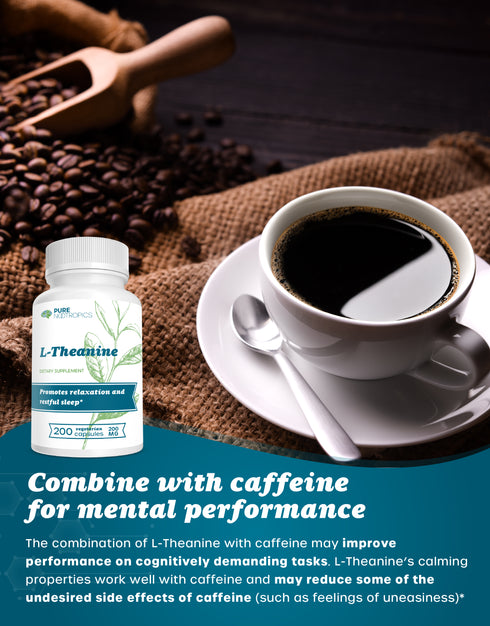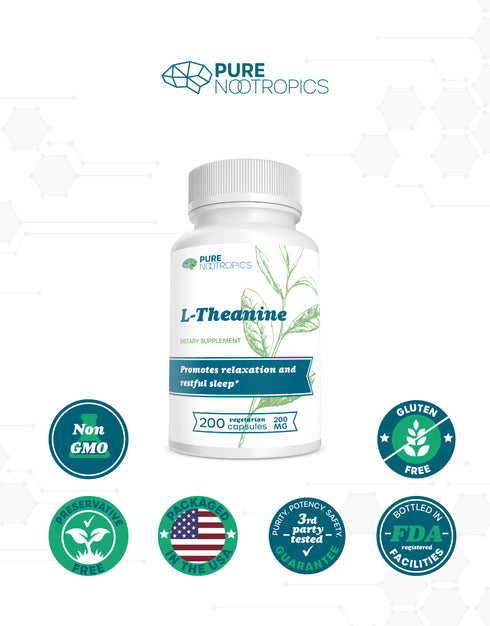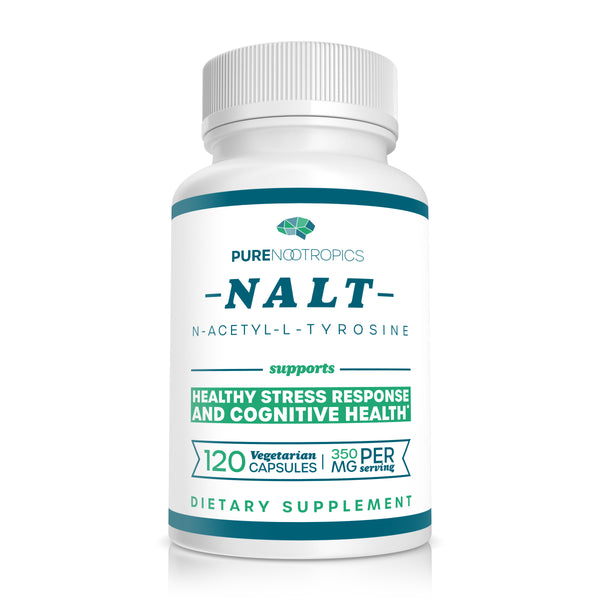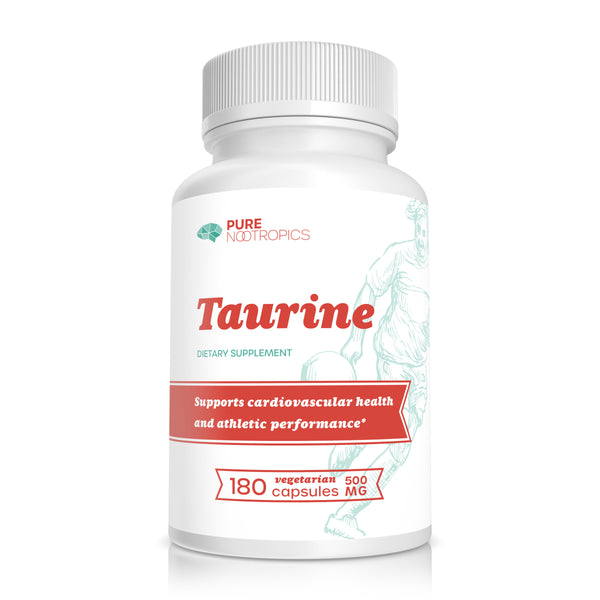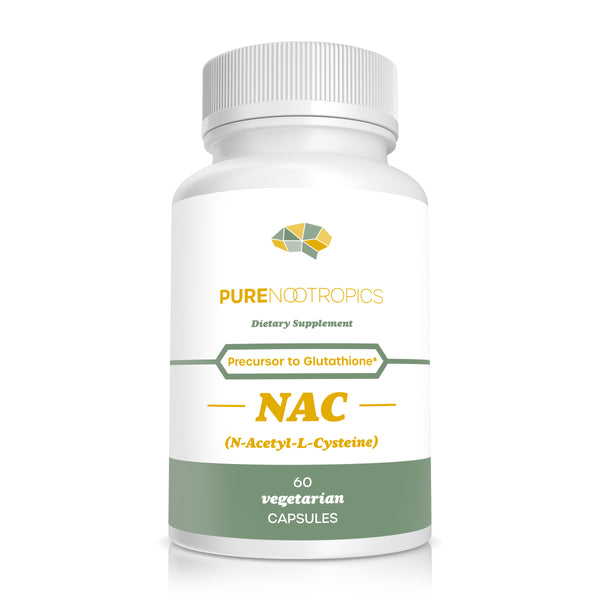L-Theanine is a nootropic found in tea leaves that promotes relaxation and sleep and can be combined with caffeine for improved cognitive performance and focus.
- Promotes sleep quality (ref)*
- Increases alpha brain waves (ref)*
- Stress Support (ref)*
- When combined with caffeine, supports cognitive performance (ref)*
- General Recognized As Safe (GRAS) by U.S. FDA (ref)
L-Theanine is an amino acid which naturally occurs in tea leaves and some forms of mushrooms. Tea (Camellia sinensis) contains 1-3% of L-theanine.
It is used in a supplemental form isolated directly from tea leaves or prepared via chemical synthesis or biosynthesis (1). Green, black, oolong and white tea all contain L-Theanine in varying amounts (2). Green tea and black tea contain the highest amounts of L-theanine, but the studies are conflicted about which of the two has the most (3).
L-Theanine Mode of Action
L-Theanine promotes sleep quality due to its ability to promote relaxation by increasing alpha-brain waves and regulating excitatory neurotransmitters that may inhibit restful sleep. Alpha-brain waves (8-13 Hz) are the brain waves associated with relaxation and alertness and are produced within 30-40 minutes after ingestion. The alpha-brain waves (or “a-waves”) occur in the occipital and parietal regions of the brain and prepare the body for a relaxed state prior to sleep (4)(5).
L-Theanine may regulate stress levels by modulating the sympathetic nervous system when faced with an acute stressor by reducing heart rate and salivary stress immunoglobin A, leading to anti-stress effects (6).
Combined with caffeine, L-Theanine may improve performance on cognitively demanding tasks through its synergistic effects. L-Theanine may lessen some of the unwanted effects of caffeine (7).
L-Theanine Mode of Action
L-Theanine is absorbed through the intestines and reaches the blood-brain barrier in approximately 50 minutes after ingestion, similarly to the absorption through natural tea leaves(1). L-Theanine can be found in the brain in the hippocampus after ingestion--the area of the brain responsible for learning and memory (8)(9).
L-Theanine Chemical Properties
Theanine has two isomers (or forms): L-Theanine and D-Theanine. L-Theanine is the only form of Theanine found in tea and is the best form because it has the highest absorption capacity. D-Theanine is not naturally occurring in foods.
When Theanine is produced synthetically, either via chemical synthesis or biosynthesis, both isomers are produced. The “L” form has an absorption level approximately three times higher than the “D” form (11). If they are administered together, the “D” form can prevent the “L” form from being absorbed in the body (10). It is not clear if the “D” form provides the benefits the “L” form is so widely used for (1) so it is essential to know the purity of the supplement you are using.
Pure Nootropics’ L-Theanine is third-party tested for quality and delivers 99.1% of L-Theanine.
L-Theanine Capsules & Dosage
Pure Nootropics’ L-Theanine Capsules provides an extra strength dose of 200 mg per capsule. Suggested use for adults is up to 2 capsules by mouth daily, or as directed by your healthcare practitioner. Daily use may reduce efficacy.
The cognitive benefits associated with caffeine in combination with L-Theanine were studied on 50 mg caffeine to 100 mg L-Theanine, so we recommend caffeine to L-Theanine ratio should be 1-part caffeine to 2 parts L-Theanine (7).
L-Theanine Side Effects & Toxicity
L-Theanine has GRAS status by the U.S. F.D.A. but may possibly reduce blood pressure and interactions could occur with some blood pressure medications, herbs, or other supplements. If you are taking any medications, herbs, or supplements, please consult your healthcare practitioner before beginning use of a supplement.
L-Theanine may reduce the effects of caffeine and mask the symptoms of taking too much caffeine. These include the effects of energy drinks, coffee, black tea, oolong tea, guarana, mate, cola, and others. Please be aware of your caffeine consumption during supplementation with L-Theanine (1).
For further information, please see our References Tab above.
The references below are not meant to imply that any of our products treat, cure, or diagnose any disease or human condition. References to clinical studies and pre-clinical studies may use varying dosages and may not represent the dosages or subsequent results of products we sell; however, the references provided are pertinent to the subject supplement itself. References provided are intended for research and informational purposes only and do not represent the entire body of knowledge available on the subject(s) referenced; nor do they represent all possible outcomes associated with the subject(s) referenced including, but not limited to, adverse effects, precautions, or chemical interactions within the human body. The Content provided on this website is not intended to be a replacement for professional medical advice, treatment or diagnosis. Never ignore the advice of a medical professional or delay in attaining professional advice because of information or impressions you gather on this website. Choosing to rely on any information provided by the Content of this website is solely at your own risk. We encourage our audience to do their own research beyond the resources we have provided so your decision is as educated as possible.
• Promotes sleep quality* Rao TP, Ozeki M, Juneja LR. In Search of a Safe Natural Sleep Aid. J Am Coll Nutr. 2015;34(5):436-47. doi: 10.1080/07315724.2014.926153. Epub 2015 Mar 11. PMID: 25759004. Nobre, AC, et al. “L-Theanine, a Natural Constituent in Tea, and Its Effect on Mental State.” Asia Pac J Clin Nutr., vol. 17, no. 1, pp. 167–8., www.ncbi.nlm.nih.gov/pubmed/18296328.
- Increases alpha brain waves (ref)*
• Stress Support* Kimura, K, et al. “L-Theanine Reduces Psychological and Physiological Stress Responses.” Biol Psychol., vol. 74, no. 1, Jan. 2007, pp. 39–45., www.ncbi.nlm.nih.gov/pubmed/16930802.
• When combined with caffeine, supports cognitive performance* Owen, GN, et al. “The Combined Effects of L-Theanine and Caffeine on Cognitive Performance and Mood.” Nutr Neurosci., vol. 11, no. 4, Aug. 2008, pp. 193–8., doi:doi: 10.1179/147683008X301513. • General Recognized as Safe (GRAS) by U.S. FDA “GRAS Notices.” U.S. Food & Drug Administration, www.accessdata.fda.gov/scripts/fdcc/index.cfm?set=GrASNotices&sort=Date_of_closure&order=ASC&showAll=true&type=basic&search=theanine.
1. “Theanine.” Food, Herbs & Supplements, Professional. Natural Medicines, Therapeutic Research, naturalmedicines.therapeuticresearch.com/databases/food,-herbs-supplements/professional.aspx?productid=1053.
2. Boros, Klára et al. “Theanine and Caffeine Content of Infusions Prepared from Commercial Tea Samples” Pharmacognosy magazine vol. 12,45 (2016): 75-9.
3. Keenan, Emma and D. A. Finnie, Mike and S. Jones, Paul and J. Rogers, Peter and Priestley, Caroline. How much theanine in a cup of tea? Effects of tea type and method of preparation, Food Chemistry – FOOD CHEM, March 2011, Vol. 125, pp. 588-594, doi:10.1016/j.foodchem.2010.08.071.
4. Rao, Theertham P., et al. “In Search of a Safe Natural Sleep Aid.” Journal of the American College of Nutrition, vol. 23, pp. 436–447., www.grc.com/health/research/Sleep/In Search of a Safe Natural Sleep Aid.pdf.
5. Nobre, AC, et al. “L-Theanine, a Natural Constituent in Tea, and Its Effect on Mental State.” Asia Pac J Clin Nutr., vol. 17, no. 1, pp. 167–8., www.ncbi.nlm.nih.gov/pubmed/18296328.
6. Kimura, K, et al. “L-Theanine Reduces Psychological and Physiological Stress Responses.” Biol Psychol., vol. 74, no. 1, Jan. 2007, pp. 39–45., www.ncbi.nlm.nih.gov/pubmed/16930802.
7. Owen, GN, et al. “The Combined Effects of L-Theanine and Caffeine on Cognitive Performance and Mood.” Nutr Neurosci., vol. 11, no. 4, Aug. 2008, pp. 193–8., doi: doi.org/10.1179/147683008X301513.
8. “Theanine,” Examine.com, published on 8 December 2013, last updated on 15 October 2018, https://examine.com/supplements/theanine/. 9. “Hippocampus.” Wikipedia, en.wikipedia.org/wiki/Hippocampus.
10. Adhikary, Rajeskhar, and Vivekanada Mandal. “l-Theanine: A Potential Multifaceted Natural Bioactive Amide as Health Supplement.” Asian Pacific Journal of Tropical Biomedicine, vol. 7, no. 9, Sept. 2017, pp. 842–848., doi:https://doi.org/10.1016/j.apjtb.2017.08.005.
11. “Difference Between Theanine and L-Theanine.” static.squarespace.com/static/50fc4a71e4b0499abb04cb0e/t/516d645de4b0bb1f91d5175f/1366123613725/Difference Between Theanine and L-Theanine (original).pdf.
12. “L-Theanine.” Alternative Medicine Review, vol. 10, no. 2, 2005, chiro.org/nutrition/FULL/L-Theanine_Monograph.pdf.


